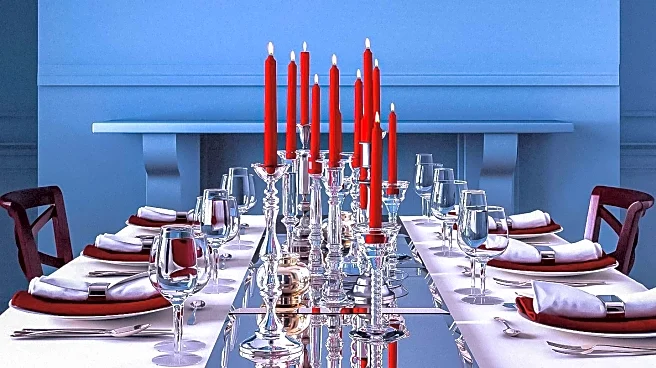What's Happening?
The British Museum recently hosted a unique solo dining event in its Japan galleries, aimed at challenging the stigma associated with eating alone in the UK. The event, organized by communications agency
Exposure for itsu, a chain of British East-Asian restaurants, featured single tables set opposite display cases with samurai armor, offering guests a tranquil dining experience. This initiative is part of a broader trend among London institutions to offer unusual experiences and diversify revenue streams. The museum received payment for the use of its space, highlighting the commercial aspect of such events. This approach aligns with efforts by various museums to attract new visitors and generate income through creative programming.
Why It's Important?
The solo dining event at the British Museum reflects a growing trend among museums to innovate and diversify their offerings to attract visitors and generate revenue. With public funding and international visitor numbers below pre-pandemic levels, museums are increasingly relying on creative programming to engage local audiences and balance their budgets. Events like these not only provide financial support but also enhance the cultural experience, drawing in crowds who might not otherwise visit. This strategy is crucial for museums facing financial challenges due to real-term cuts and rising overheads, ensuring they can continue to offer free public access to their permanent collections.
What's Next?
Museums across London are likely to continue expanding their after-hours and commercial event offerings to sustain their operations. The British Museum, for instance, plans to highlight its Mitsubishi Japanese Galleries and promote its upcoming samurai exhibition in February 2026 through such events. As museums seek to stabilize their funding, they may increasingly host private hire events, product launches, and themed experiences to attract diverse audiences. This trend could lead to more collaborations with brands and creative agencies, further integrating commercial activities into cultural programming.
Beyond the Headlines
The shift towards commercial events in museums raises questions about the balance between cultural integrity and financial necessity. While these events provide essential revenue, they also transform the traditional museum experience, potentially altering public perceptions of these institutions. As museums navigate financial pressures, they must consider the ethical implications of commercializing cultural spaces and ensure that their core mission of education and preservation remains intact.









